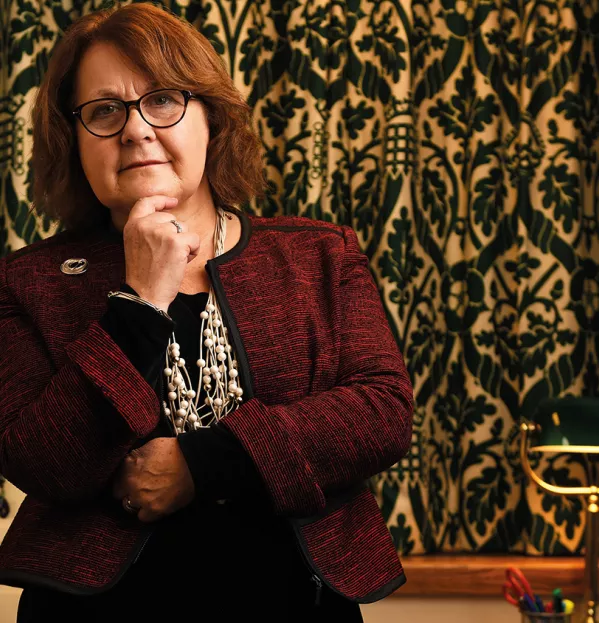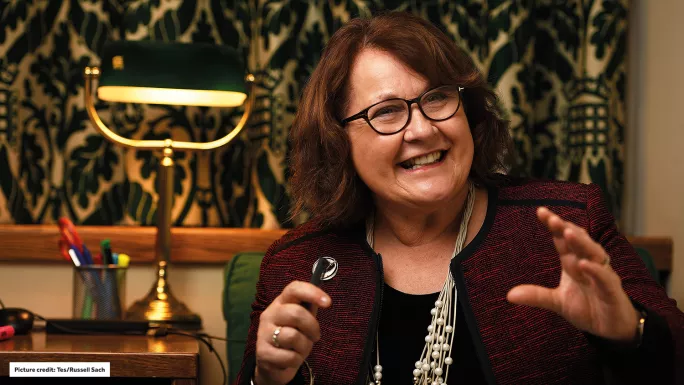‘I am the mouthpiece of teachers and heads...I know what’s being said’

“I feel almost like I am protecting my profession, really.”
After more than three decades as a teacher and school leader, and with classroom experience that covers the pedagogical spectrum, few people are in a better position to fulfil the role of the profession’s protector in Parliament than Thelma Walker.
In one of the biggest surprises of last year’s snap election, Walker overturned a 5,000 Conservative majority to win the West Yorkshire seat of Colne Valley for Labour.
It is an area she knows well, having lived and worked there for most of her life, and it is a landscape familiar to millions of television viewers through programmes such as Last of the Summer Wine and Happy Valley.
Since her election, Walker’s continued passion for education has been clear. She joined the Commons Education Select Committee, where she has quizzed ministers, Ofsted’s chief inspector and the government’s academies tsar on everything from primary assessment and the collapse of Wakefield City Academies Trust to Sure Start cuts.
And she used her maiden speech in the Commons to warn her new colleagues that “my experience of education and of how children learn and thrive tells me that a culture of targets and tests does not result in a happy, clever or creative child”.
This argument, and the need for a “whole-child approach”, emerges frequently in conversation in her Westminster office - tiny, furnished with standard Commons-issued green curtains, carpets and chairs, but in a much-desired location near the chamber itself.
“I am the mouthpiece of these teachers and headteachers,” Walker says.
“I have conversations with them regularly. I get into schools as often as I can. Obviously, I still have connections with ex-colleagues, and I know what is being said.”
She seemed destined to be a teacher from an early age, and her family jokes about how, as a child, she used to line up her teddies in a row and try to teach them.
The MP trained at Manchester Polytechnic, where she received an early piece of advice that influenced her throughout her teaching career, and also in her political career.
“A very experienced tutor came in to observe my very first lesson,” she recalls. “I always remember this. He said: ‘That was really good. You met this objective and that objective. But next time stop playing the part of the teacher and just be you.’
“I took that on board because it was almost like I was that child role-playing again, lining up my dolls and my teddies. I listened to what he was saying: those secondary pupils, they needed to see my warmth and needed to engage with the person as well as the teacher disseminating information, because it is not just about your subject.
“Whatever age you are teaching, and with the staff, you have to fundamentally have trust and a good relationship for learners to learn and teachers to teach. You are not in role. You are giving information but they need to see you as a person and that relationship needs to develop. Trust is fundamental to me.”
Voice of experience
In an age of widespread cynicism about career politicians and Westminster elites, she arguably has more authenticity than many younger colleagues, having been elected at the age of 60 after decades working in the wider world. “I think the public are not wanting spin, but they want people who can say, ‘I want to be involved in this and influence policy because I have experienced this.’”
She first qualified as a secondary English teacher, but after nine years she retrained to become a primary teacher.
The reason was a combination of a reorganisation of education in Greater Manchester, where she was teaching at the time, and the fact she was visiting primary schools for her eldest son. “It was just a moment when I thought to myself, ‘Hey, this looks really interesting.’ It was the cross-curricular approach and the vibrancy of the primary classroom. That, combined with the reorganisation - which gave staff the opportunity to retrain if they wanted to - [meant] I thought, ‘I’m going to grab this chance.’”
She later moved to the Colne Valley, where her teaching career culminated in two headships, but it was the advent of Michael Gove as education secretary that started her on the road that would lead to Westminster.

For Walker, the “Every Child Matters” agenda of the Blair and Brown governments was “the nearest we have got to getting it right”, when she saw creativity as well as accountability, and felt that there was trust in the teaching profession.
“When the new regime came in under Michael Gove, Every Child Matters was swept out. It was replaced by a very rigorous targets and tests culture, and that’s when I thought, ‘This could have been so good if we had carried on with [it]’, but the results were not quick enough for the new regime. I knew I wasn’t willing to change my ideology, so I thought that rather than sitting moaning in a corner, I will give myself to politics and become more active and try to change it through politics.”
She left headship in 2012 to get involved in local politics, including stints as chair and secretary of her local Labour branch, and supporting her husband’s successful campaigns to become a local councillor.
But leaving school was still a wrench.
“I always vowed to myself that I would quit when I stopped enjoying it, and I did,” she says. “I just thought, ‘I’ve stopped enjoying it because I can’t support these children and young people in the way that I believe is right.’
“It was really, really hard for me, and that first year, I found it incredibly difficult.”
The best of both worlds
Engaging with children and camaraderie with colleagues are among the things she says she missed “tremendously”. But with a role that now combines frequent school visits with a seat on the Commons Education Select Committee, Walker says she has the best of both worlds.
One of the biggest school announcements since her election has been about the reforms to primary assessment, with the Department for Education going a long way towards meeting the demands of primary school leaders.
But Walker has mixed feelings about the changes. Scrapping key stage 1 tests is “one step in the right direction, I suppose”, but then the introduction of times-table tests in Year 4 is “just another form of external assessment”.
“I think that there’s still a lot of work to do in terms of assessment, and listening to professionals and how children learn, how they achieve. At the moment we have a bit of a culture of being done to, rather than through. That’s what teachers feel: they are being done to, rather than through.”
The priorities she lists for the new year echo those of the wider select committee: social justice and mental health support for young people, which the committee will start taking evidence on this month.
But for Walker, in particular, the extra demands being piled on teachers in terms of protecting children’s mental health deserve particular scrutiny.
“I think teachers are saying: ‘Where does my brief end? I came into this as an educator. Of course there’s a pastoral role, but I’m not a mental health nurse. What else am I responsible for?’
“I just feel that part of my role will be watching over how these things unfold. I feel almost like I am protecting my profession, really, saying teachers always care about their pupils, and there always has to be the safeguarding and pastoral role, but it’s about saying, ‘Enough, I can only do so much.’”
You need a Tes subscription to read this article
Subscribe now to read this article and get other subscriber-only content:
- Unlimited access to all Tes magazine content
- Exclusive subscriber-only stories
- Award-winning email newsletters
Already a subscriber? Log in
You need a subscription to read this article
Subscribe now to read this article and get other subscriber-only content, including:
- Unlimited access to all Tes magazine content
- Exclusive subscriber-only stories
- Award-winning email newsletters